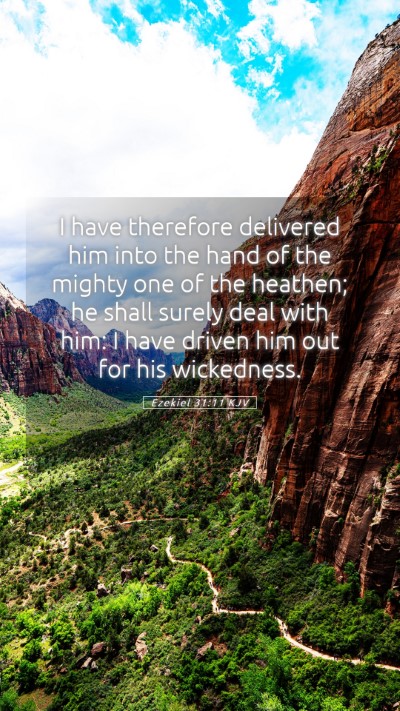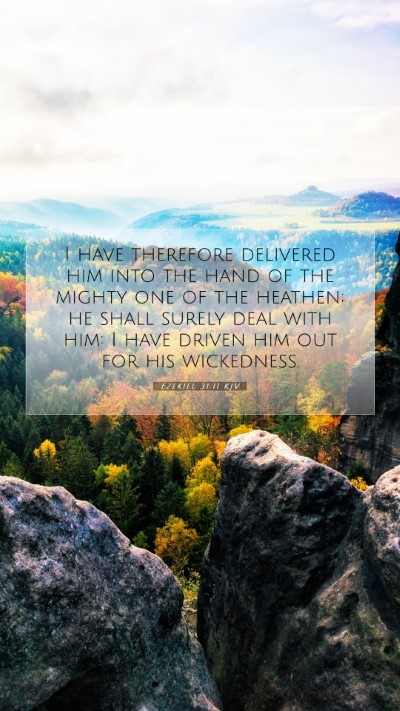Ezekiel 31:11 - Understanding the Depths of Scripture
This commentary seeks to provide insightful meanings and interpretations of Ezekiel 31:11, drawing from prominent public domain commentaries. The aim is to enhance your **Bible verse understanding** and **explanations** through thorough **Scripture analysis**.
Verse Context and Content
Ezekiel 31:11 states: "I will give it into the hand of the mighty one of the nations; he shall surely deal with it: according to his wickedness I will drive it out." This verse comes in the context of a prophecy concerning the fall of Egypt, likening Pharaoh and his strength to a great tree that will be cut down.
Combined Insights from Commentaries
Matthew Henry's Commentary
Matthew Henry emphasizes the metaphorical implications of the mighty one representing the power of God allowing foreign nations to enact judgment on Egypt. Henry draws attention to the idea that God uses both the righteous and the wicked to fulfill His purposes. The 'tree' symbolizes the proud nation that will face divine retribution due to its arrogance and rebellion against God.
Albert Barnes' Notes
Albert Barnes elaborates on the interpretation of the 'mighty one of the nations,' suggesting that this refers to the Babylonian king, Nebuchadnezzar, who would be the instrument through which God's judgment would be executed. Barnes posits that the cutting down of the tree illustrates the ultimate downfall of the oppressive and mighty nations, symbolizing God's sovereignty over all political powers.
Adam Clarke's Commentary
Adam Clarke provides further depth by interpreting the phrase “according to his wickedness” as an indication of the just nature of God’s judgment. Clarke underscores that the actions taken against Egypt are in direct correlation to the nation's sinfulness and pride. The underlying message reflects the theological theme of divine justice where nations are held accountable for their behaviors.
Historical Context
Understanding the **historical context of Bible verses** is essential. Ezekiel prophesied during a tumultuous period when Israel was under Babylonian exile. The allegorical representation of trees and beasts in Ezekiel serves to illustrate God’s relationship with nations and the consequences of their actions.
Application and Insights for Bible Study
In applying Ezekiel 31:11 to our lives and contemporary society, we can recognize that divine judgment is a recurring theme in Scripture. This verse invites us to examine our own nation and behaviors in light of our relationship with God. Moreover, this passage encourages personal reflection on pride and the pursuit of holiness.
Related Scriptures
- Isaiah 10:15: Discusses the folly of Assyria's pride.
- Jeremiah 46:25: Mentions judgment against Egypt.
- Revelation 18:10: Contains a prophecy regarding the fall of a great nation.
Conclusion
Through our exploration of Ezekiel 31:11, it is evident that this scripture holds profound implications regarding divine judgment and the transient nature of worldly power. The insights drawn from **public domain commentaries** provide a multi-faceted understanding of the passage, encouraging us to seek deeper insight and engage earnestly in **Bible study**.
Keywords to Enhance Bible Study Engagement
Utilize this study as a part of your **Bible study groups**, **online Bible study**, or as a guide for **Bible study lessons**. For those keen on further **Bible study resources** or **Bible study materials**, exploring various commentaries can bolster your comprehension and enable you to **interpret Bible verses** more effectively.
The task of understanding Scripture may be daunting, but through dedicated examination, **in-depth Bible verse analysis**, and communal engagement, we can foster a richer spiritual life and growth.


